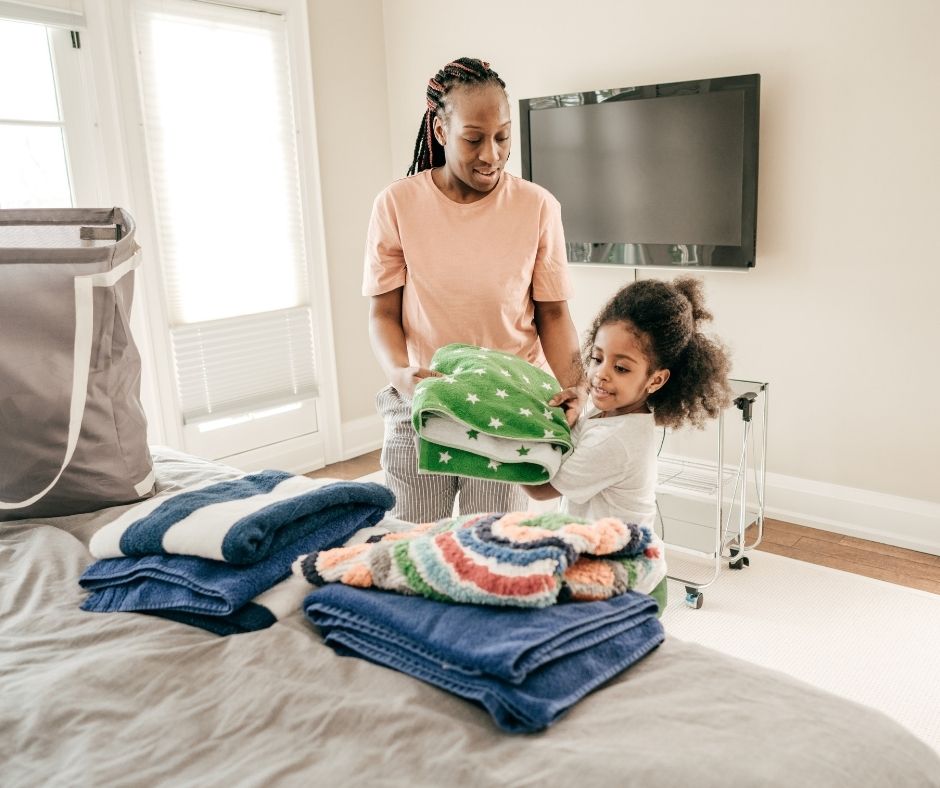Young children can learn a lot from doing household chores. Few of us like doing them, but these tiring and time-consuming duties must get done for a household to run efficiently. Of course, adults will do their responsibilities around the house, but when it comes to assigning chores to young children, there’s some debate here. Asking your kid to pitch in will give you a break-and it actually benefits them. A kid who does household chores will often feel an important sense of responsibility and belonging. Here are some reasons why household chores can help them.
Here are the top 10 reasons why chores for kids is important in Dallas
Helps Motor Skills
There are plenty of things that children can do around the house which will help develop their gross and fine motor skills. Whether it’s a smaller kid pulling up weeds or an older kid trying to manage both broom and dustpan, house chores will help children practice their motor skills.
Chores help improve self-control.
Knowing that a task needs to be done before watching their favorite TV shows or having a treat may help kids learn delayed gratification, which is a form of self-control. A 2011 research from the University of Chicago demonstrated many rewards to improve self-control. In fact, kids with bad self-control were observed to make more errors as adolescents. The young children with poor self-control were also more likely to have difficulty financially in adult life.
Chores help improve time management skills.
It feels like there are a thousand things to do during the day, and fitting it all in our journal is a challenge! Taking responsibility for chores will help teach kids time management as they balance work and play. Chores can assist older kids and teens in developing good practices early. Balancing schoolwork deadlines, housework, and social life helps them set goals and manage their time, essential abilities for the working world.
Chores can boost your child’s confidence.
It might surprise you, but the simple task of picking up toys or loading the dishwasher can improve your kid’s confidence and self-esteem. Kids like to become doers, and if you’ve noticed, they want to participate in grown-up tasks. Learning how to do household chores shows your child that other lessons can be easily learned and completed while school can feel like a challenge.

Chores that involve some degree of responsibility, like caring for younger siblings or even pets, can also infuse this notion of capacity. Remember to compliment your child when chores are finished. Positive feedback indicates you recognize your kid’s hard work and effort. And this, in return, means a feel-good improvement in confidence.
Improve Organization Skills
Having weak organizational skills could be frustrating for children, especially in school. But house chores will help them get more organized without feeling forced. For instance, setting the dining table needs a lot of organization and attention to detail. Your kid needs to put out the napkins and organize the plates, silverware, as well as glasses. Kids who do this every day will find out the most efficient way to do it. When you start your kid on a new chore, it helps to write a list of the steps. After a while, give out more complex housework like helping you make a salad for dinner. That involves numerous steps like washing the veggies, peeling, chopping, and putting the ingredients in a bowl, with the lettuce at the bottom. You can even come up with an easy recipe for the dressing.
House chores help teach kids teamwork.
Kids who do chores better understand how their part helps the whole family. They get to see first-hand how their activities make life simpler or more challenging for people they care about. Being a productive member of a group can be modeled for the children through housework. Members of the family “team” are responsible to each other, and there are consequences whenever you don’t meet each other’s expectations. Knowing these lessons in your own home, where mistakes are more easily forgiven, can help kids build solid teamwork skills to use in school or work.
Chores help teach life skills.
They’re young now, but they will not be kids forever! Cooking, laundry, and budgeting are just some of the skills your kids will require once they finally go out on their own. These are also things that institutions do not thoroughly teach, making learning them at home even more essential. Performing chores gives a child the chance to give back to their parents for all you do for them.

Kids start to see themselves as crucial contributors to the household, and they feel a connection to the family members. Holding them accountable for their chores can increase their responsibility and make them more responsible. Kids will feel more capable of meeting their responsibilities and completing their duties.
Chores can help your child determine strategies.
If your child has problems focusing at school, basic chores like cleaning their room on a weekend morning may also feel challenging. Staying involved with the job may be complicated. And if, for instance, a younger sibling can organize and clean faster and has plenty of time left to watch cartoons, that can make your kid feel inadequate and discouraged. But some workarounds will help kids keep making improvements. A simple, step-by-step chart breaks a big job into several small ones that can help them stay on activity and finish each step of the process. You might create a playlist that the child can listen to while completing house chores. Once the last song ends, so does the cleaning. When children who struggle with concentration understand that they can get things done regardless of their difficulties, success will stay with them. They can feel motivated by having discovered techniques that work for them.
Chores help strengthen respect.
It takes moving away from home for most of us to fully appreciate all the effort our parents made around the house. Our children are likely no different, but assigning them tasks may help this insight come slightly quicker. Children could become more aware of the interferes they make if they’re assigned with cleaning up around the household and more respectful of the tasks that go into maintaining a home.
Chores Prompt Family Bonding
People usually complain that chores take up time they could be spending with their children or the whole family. But chores can create special memories involving children and adults. Children who usually want to help will feel very important and receive a self-esteem boost, and moody teens might wish to open up over a shared task.

It is okay if it takes your child a bit longer to do a house chore. And you may need to redo parts of it. However, doling out responsibility shows kids they have value. You can make it an even more successful experience by selecting the appropriate house chores for your kid and helping your kid stay on top of them. And sincerely praising their work can make your child feel more confident and capable.




